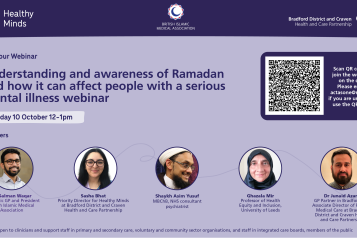Regulator finds improvements at Bradford District Care NHS Foundation Trust

The Care Quality Commission - which regulates all health and social care services in England - carried out short-notice announced inspections to look at how well-led the trust is overall.
It also looked at community mental health services for adults of working age, specialist community mental health services for children and young people and crisis and health-based places of safety.
Overall rating 'good'
This inspection sees the overall rating for the trust, how well-led it is and community mental health services for adults of working age all move up from requires improvement to good. Crisis and health-based places of safety remain rated as good overall.
However, the rating for specialist community mental health services for children and young people moves down from good to requires improvement.
Bradford District Care NHS Foundation Trust provides mental health, community and learning disability services for all age groups across Bradford, Airedale, Wharfedale and Craven.
'Improvements made'
Brian Cranna, CQC’s head of hospital inspection (mental health and community health services), said: “At Bradford District Care NHS Foundation Trust, we found a trust with a diverse and skilled leadership team who are passionate about their roles and have an awareness about what is happening on the front line.
"The team want to provide the best possible care to people in the local area and have addressed many of our concerns highlighted at the previous inspection.
“We were pleased to hear that staff now felt the organisation took a genuine interest in their wellbeing, they spoke of a positive open culture from senior leaders and were encouraged to develop their skills to achieve the best possible outcome for patients. This was reflected in the feedback about staff being kind, caring and compassionate.
“Improvements had been made in the community-based mental health services of adults of working age and it was reassuring to hear from patients that the support they were offered had kept them out of hospital. Additionally, we found managers in this service investigated incidents thoroughly with involvement from patients and their families, and necessary changes made to improve patient care.
Although we saw many improvements, there is still more work to be done in the specialist community mental health services for children and young people. Waiting times were an issue due to various factors, including staffing pressures, and staff weren’t consistently completing and updating risk assessments.
"We found some records hadn’t been updated after incidents had taken place. It’s important that the trust is aware of these incidents to ensure risks are managed to prevent them from happening again.
"However, people using this service said they felt supported by caring and respectful staff who listened and understood their needs. We recognise that the trust has worked hard to achieve this rating and we will continue to monitor them and give support in the areas where improvements are required, and to help them sustain areas where they’re delivering good patient care.”
Inspectors found:
- The trust had an experienced and skilled leadership team and a board of non-executives who were passionate and from a range of backgrounds bringing diverse experience to their roles.
- The trust had a focus on the well-being of staff, offering incentives as well as practical and emotional support.
- The trust was responsive to the diverse needs of the population it served, had awareness of and was acting working to reduce health inequalities.
- The trust engaged with partner organisations to be an active part of the integrated care system and to ensure their voices were heard in the improvement of services.
- The trust had successfully embedded and managed a large vaccination programme for both adults and children.
- There were some areas of outstanding practice which included the development of a critical incident stress debrief service; this included sessions offering ‘psychological first aid’ to staff.
However:
- Information about patients, their care and risks were not always accessible. In community mental health services for adults and for children and young people, risk assessments and care plans were not stored consistently.
- The duty of candour regulation was not fully applied in the incidents we reviewed because an early apology was not always given in line with the legislation and was not part of the trust’s processes.
- The trust had processes in place to monitor areas of risk and concern. However, in some risks in front line community services such as staffing and caseload levels, were not always prioritised by the board.
- Waiting times in some services were too long, including adult and children’s neurological services, dental treatment as well as therapies.
- The trust had begun to make improvements to their patient safety process including investigation of serious incidents. However, this required further improvement.
Downloads
Read the latest CQC report for Bradford District Care NHS Foundation Trust.


